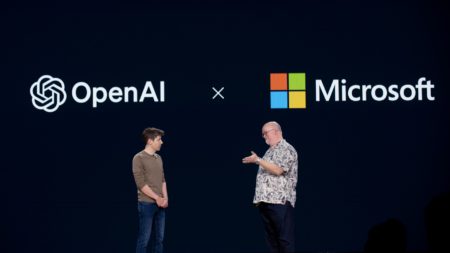Knowing the kinds of readers we have here, I strongly suspect that if you drew a Venn diagram of “TDWTF Readers” and “TikTok Users” those circles wouldn’t overlap at all. But TikTok is in the news, and because my partner uses TikTok, I’m getting second hand smoke of all of this, I think there’s some interesting things to talk about here.
If you’ve been avoiding this news, good for you. For a long recap, Ars can bring up up to date.. But as a quick recap: TikTok is owned by Bytedance, which is based in China, and subject to Chinese laws. TikTok, like every other social media company, is basically spyware, tracking your behavior to sell your eyeballs to advertisers. Over the past few years, all three branches of the US government have decided that the “Chinese ownership” is the problem here (not so much the spying), and passed a law to ban it unless a US company buys it. The whole thing has turned into an idiotic political football, with Biden saying that his waning days of the Presidency wouldn’t enforce the ban anyway, and then the whole thing turns into a Trumpist political football as the incoming President is playing Calvinball and making decrees that he did not (at the time) have any authority to make in the first place.
Because of this ban, TikTok ceased operating in the US on Saturday night, displaying banners discussing the ban, and appeals directly to Trump to undo it. On Sunday, TikTok came back up, now with banners thanking Trump for being ready to work with them.
Now, I’m mostly not interested in commenting on the political aspects of this, and you’re mostly not interested in hearing it. But for the record: this whole thing is stupid. The root cause of the problem is that the US has no real consumer privacy law, but fixing that problem would be bad for companies like Google and Meta. So, instead, we play Whac-a-Mole with apps, dressing up Sinophobia as a national security threat, and we dance around the 1st Amendment issues. And then the whole thing of a President just deciding to rewrite a law at his whim is terrifying if you like the world to operate according to predictable rules, and presages a rather awful next four years.
What I really want to talk about is conspiracy theories. Because when TikTok came back up, it was suddenly flooded with “IT professionals” who were positing a dark conspiracy: during the downtime, Meta purchased TikTok and migrated all of TikTok’s services into Meta’s infrastructure. That 12-15 hours of downtime was just the right amount of time to do that switcheroo.
Now, I’m not going to link to any of these videos, because a) as stated, I don’t use TikTok, b) TikTok requires you to use the app to watch videos, so screw that, and c) these people don’t deserve more views. So there’s an element of “take my word for it that this is happening,” but also bear with me- because this isn’t really what this article is about.
Now, I am not a Site Reliability Engineer, and have no interest in being one. But I’ve worked with large retailers building global backends for point-of-sale systems where they’re handling every point-of-sale transaction in the world. So I have some thoughts about the idea that migrating billions of videos and hundreds of millions of user accounts over to Meta’s cloud can be done in 12-15 hours of downtime.
Which, for the record, TikTok mostly uses Oracle’s cloud, so add that to the “I Hate Oracle Club” scorecard.
Let’s assume Meta purchased TikTok. Would it have needed to spend 12-15 hours down so that Meta could migrate TikTok to their datacenter? Of course not. What an absurd thing to say. As this (Instagram) video rightfully points out, the only people taking down a website for a migration are a dentist office in Ohio in 2007. TikTok is a social media service handling hundreds of millions of users and billions of requests- they’re already distributed across multiple datacenters. While spinning up services on a new datacenter isn’t a simple task, it’s a task that they’ve certainly already built the tools for. As part of their demand management system, they simply have to have the ability to spin up new service instances quickly and easily- at the scale they operate, that’s the only option.
They’re a massive distributed system. Adding new infrastructure nodes and mirroring your data elsewhere is a solved problem. All it really takes is time and the budget to run more infrastructure than you need to service requests during the migration.
The real costs are that if you’re running in a cloud, you’re likely not just using it as a set of virtual private servers- you’re likely using your host’s infrastructure-as-a-service abstractions, and that means that you might be tightly coupled to their implementation of a variety of cloud services. The real costs are that you’d need to make code changes to actually support a new cloud provider. And that’s definitely not happening in a 12-15 hour time frame.
But this is a dumb conversation to have, because if we assume Meta bought TikTok: there’s no need to migrate anywhere. In this scenario, Meta has the keys to TikTok’s infrastructure. Whatever they want to do, they can just… do. Sure, it means paying Oracle for hosting, but TikTok is making money. It’s a net win. Over the next months or even years, Meta could move TikTok services into their private cloud and perhaps save costs, but there’s no need to migrate on a tight timeline.
Okay, so with all that said, what an idiot I am, right? Here I am, arguing against people I don’t know, who definitely aren’t going to read this. I don’t even like TikTok, and think every social media app is a step down from just plain old RSS feeds, because I am an old person. We’re deep into “someone is wrong on the Internet” territory. So why did this drive me up onto the soapbox?
Because hearing all this conspiracy mongering nonsense reminds me of an important truth: everything looks like a conspiracy when you don’t know how anything works.
If you don’t know how cloud deployments work, TikTok’s downtime can look like a conspiracy. If you don’t know how election systems are designed, any electoral result you don’t like can look a lot like a conspiracy. If you don’t know how the immune system works, vaccines can look like a conspiracy. If you don’t know how anything works, a flat Earth starts making sense.
Realistically, no one of us can know how everything works. In an ideal world, we can defer to experts who do know how things work. But to defer to experts, we need to trust expertise.
And as a society, trust in experts has been eroding. A lot of it comes from propagandists who want their ignorance to be valued at least as highly as expertise. Being loudly wrong about things is a great way to get attention and with that, money. Alex Jones made many millions being loudly wrong.
But it’s not just loudmouthed morons that are eroding the trust in experts. Experts can and have abused the public trust. The poster child for “Worst Person Ever” is Thomas Midgely, Jr., who lied to the public and created a gigantic public health disaster, then went on to create a gigantic environmental disaster (in his defense, CFCs destroying the ozone layer wasn’t something he knew about, but he absolutely knew about the dangers of leaded gasoline).
And even more than that, in a society where peoples’ prospects look worse with each passing year, with entire generations deciding that buying a home and having children are just going to be out of reach, we have to ask: what good is it to listen to experts if it doesn’t lead to good outcomes? When all the experts work for a big mega corporation and put their big brains to work figuring out how to turn my eyeballs into dollars, or are working for think tanks and government agencies captured by those corporations, what good are experts?
All in all, it looks bleak. There’s no easy fix for any of this. The systems which make expertise viable have eroded over the past decades, taken for granted. Public trust in just… everything has weakened. Fixing this requires broad social changes. A minor tech blog that focuses in the ways people screw things up is not going to drive broad social changes.
But I think there’s one thing I can drive from here, and it comes back to this one simple statement: everything looks like a conspiracy when you don’t know how anything works.
So, I’m going to put out this call: when you know how things work, share that. Share what you know! Share it on social media. Share it on your own personal blog. Share it in local meeting groups. Hell, share it on TikTok, because gods know, they need it.
But also don’t forget the flip side: when you don’t know, be careful about finding conspiracies. When you don’t know how something works, it might look like a conspiracy. But, frequently, it’s not– you’re just ignorant. And honestly, we should be as open about our ignorance as we are about our knowledge. We should know what we don’t know, or at least know when we’re stepping outside of our areas of confidence.
So let me close with this: do you have a place you’re sharing the things you know? Do you think it’d be of interest to our readers? Use our submission form, and use the subject/title “Reader Link”. If I get enough interesting links, I may do a roundup of them.
Tomorrow, we’ll return to our regularly scheduled programming.
Utilize BuildMaster to release your software with confidence, at the pace your business demands. Download today!
Source: Read MoreÂ

